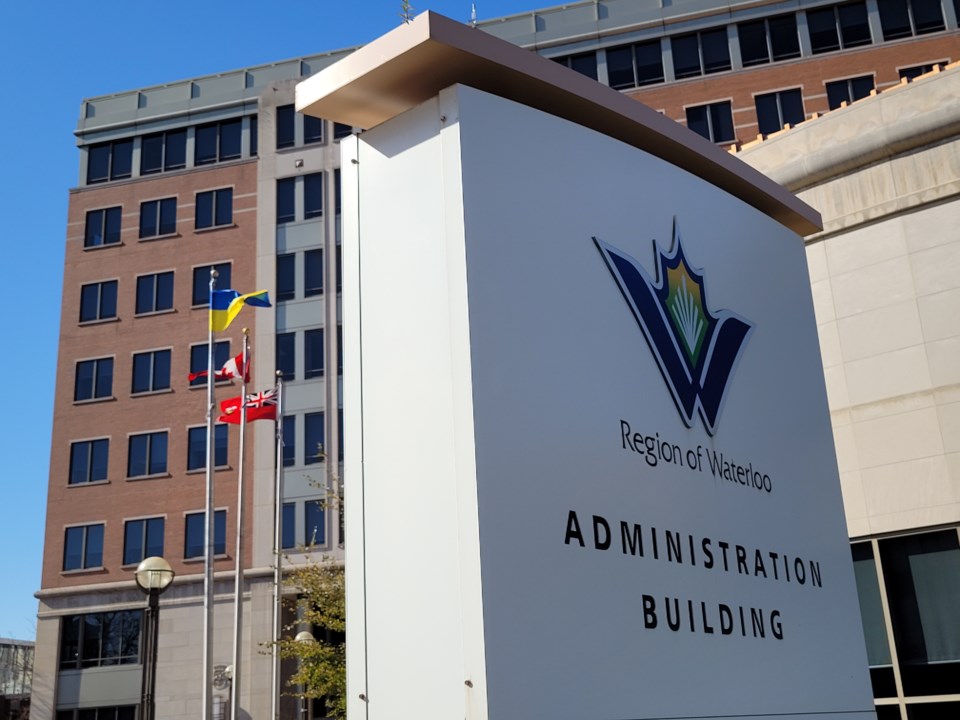Barring any last minute adjustments that come out of today's discussion, Cambridge taxpayers can expect to see an 8 per cent increase on the region's portion of their property tax bills next year.
This is in addition to the City of Cambridge portion of any increase. Those deliberations are expected to be finalized in mid-February.
The region plans to collect $753.3 million from the tax levy next year; an increase of $70.4 million over this year.
That figure includes a base budget increase and service changes totalling $56.1 million, and a Waterloo Regional Police Service increase of $14.4 million.
Proposed service changes, which will be decided when the final budget returns to regional council for approval on Dec. 13, include $6 million in service expansions, $11 million for the Plan to End Chronic Homelessness, a $1 million Community Capacity Building Fund and other enhancements suggested by regional councillors.
Chief financial officer Craig Dyer offered a bit of "good news" in advance of the final day of budget committee talks this morning.
He confirmed assessment growth, fuelled mainly by industrial and multi-residential construction over the course of 2023, is 2.18 per cent.
It will be applied to the 2024 budget to the tune of about $15 million in additional revenue.
"The way to look at this is a $15 million adjustment to the budget is possible without a tax rate impact," Dyer explained.
It is well above the region's average of about 1.6 per cent.
"It's the highest level of assessment growth we've seen, I think in the last 15 to 20 years," he said, pointing out the upward trend since the COVID pandemic hit in 2020.
He said it's very encouraging but not surprising given the amount of building permit activity and investment seen in the central transit corridor over the last year.
That larger assessment pool will also feed into municipal budgets to varying degrees as well, he said.
Today's discussion hit on tax levy impacts from planned new full time hires, which Dyer preceded by outlining the extent of regional taxpayer funding required for services that, prior to 2019, were typically funded by the province.
That tally is now topping $191 million and includes $68.7 million for housing services, $35.1 million for homelessness, $34.7 million for paramedic services, $17.1 million for employment and income support administration, $13.6 million for senior services, $11.3 million for public health programs, $8.9 million for children's services, and $1.7 million for Ontario Works allowances and benefits.
Dyer said the rapid erosion of provincial funding since 2019 is pushing the Association of Municipalities Ontario to ask for a revamped fiscal framework between the province and its municipalities.
To make up for the downloaded responsibilities, Dyer says staff make efforts every year to find operating efficiencies to lessen the impact on taxpayers.
Since 2019, those savings, attributed to things like energy saving retrofits, adjustments to staffing levels, new user fees and revenue streams, and other service level adjustments, have totalled $40.5 million.
Heading into 2024, the region has trimmed those areas to realize savings of $3.3 million, he said.
Dyer's outline preceded presentations from Paramedic Services, Grand River Transit and others whose needs have been detailed throughout budget deliberations around the need to hire more staff next year.
Speaking to the number of staff increases in the budget, Kitchener Mayor Berry Vrbanovic questioned management's commitment to the level of austerity he feels is needed as residents struggle with affordability.
He said he doesn't think the region is being as aggressive as it needs to be in finding staffing efficiencies that "reduce the pressures in an incredibly difficult time for our residents around a higher tax increase," he said.
"I don't feel that there's the same level of scrutiny being applied here to really appreciate the pressure points that people are feeling."
Dyer countered by saying any increase to the region's full-time employees is "heavily weighted" to where service level expansions have been proposed.
As CAO Bruce Lauckner explained, he was tasked with taking "millions and millions" out of the organization in terms of efficiencies when he was brought on board in 2020. That effort was reflected in $15.4 million in savings realized in 2021.
"We want to make sure the public understands just the extent to which we go to to make sure we drive out efficiencies, but obviously we're missing the mark, so whatever council needs we can bring back," he said.
Coun. Rob Deutschmann suggested pushing back the start dates for any new employees to help lessen the impact on taxpayers.
After about an hour of further discussion, councillors agreed it would help in their final decision to know those details and directed staff to re-examine the proposed service expansions further and report back with how a delay in implementation could lead to a decrease in the tax levy.
Regional Chair Karen Redman asked that staff's report include a summary of how much the region is responsible for through legislation and provincial mandate, how much other levels of government pay, and the impact it could have on service levels, "not just the start dates."
The final public input session for the 2024 budget is scheduled for this evening.
Motions to amend the budget will be accepted from regional councillors until Dec. 4.
